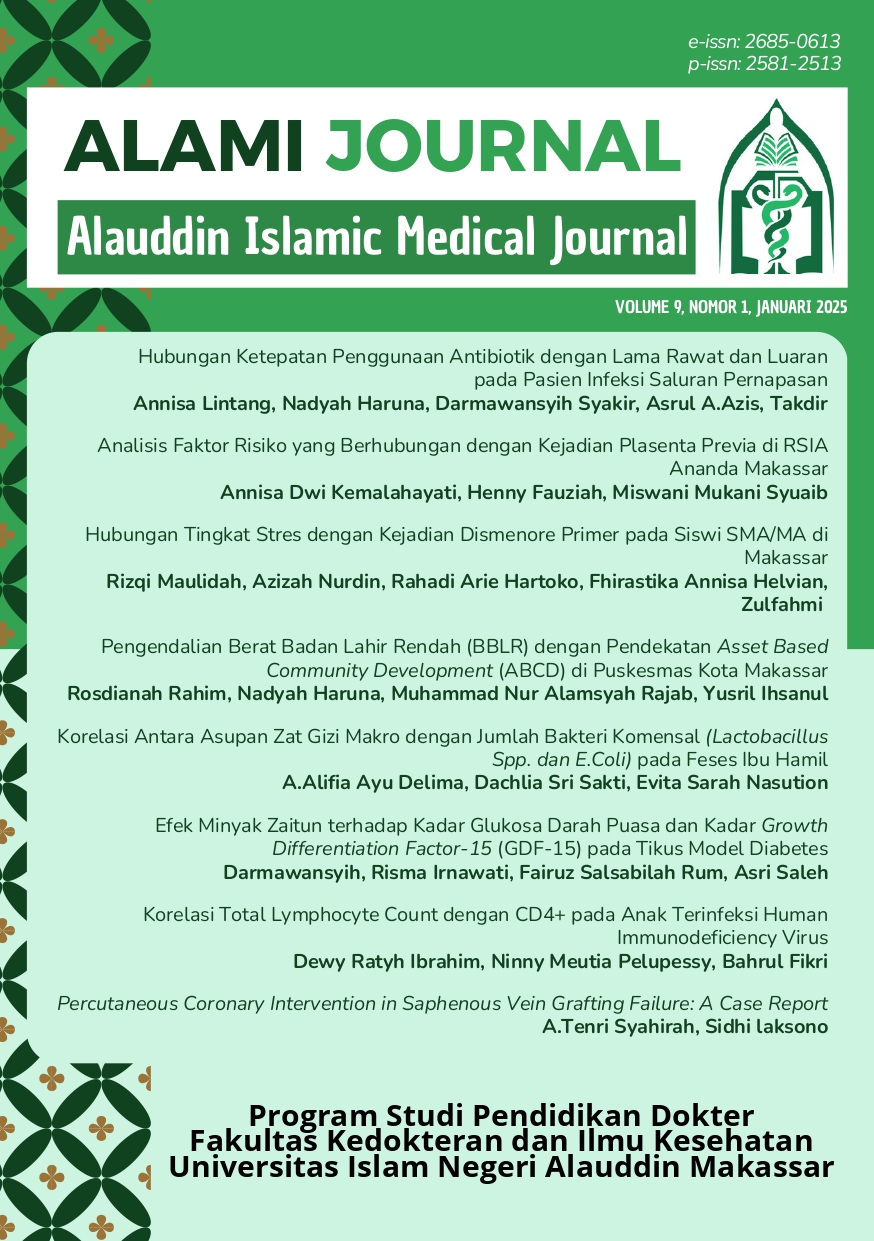The Correlation Between Macronutrient Intake and the Number of Commensal Bacteria (Lactobacillus spp. and E. Coli) in the Feces of Pregnant Women
DOI:
https://doi.org/10.24252/alami.v9i1.45243Keywords:
Macronutrients for Pregnant Women, Commensal BacteriaAbstract
Nutritional intake during pregnancy is important for maternal and fetal health, which is influenced by the digestive system and commensal bacteria. Lack of nutritional fulfillment can cause serious complications, such as low birth weight, stunting, and maternal death. Based on Riskesdas 2018, the prevalence of chronic energy deficiency in pregnant women in Indonesia reached 24.4%. This study looked at the correlation between macronutrient intake and the presence of commensal bacteria in the feces of pregnant women. A descriptive observational study with a cross-sectional design was conducted on 22 respondents selected through purposive sampling. Macronutrient intake data were collected using 24-hour recall and Food Frequency Questionnaire (FFQ). Fecal samples were collected independently in sterile containers, stored at 2-8°C, and analyzed in the HUMRC laboratory of Hasanuddin University Hospital using the PCR method, and Kendall's tau correlation test analysis was carried out with SPSS version 25. The results showed that 90.9% of respondents had inadequate carbohydrate intake, 86.3% had insufficient protein intake, and 68.2% had adequate fat intake. A total of 95.4% had energy intake below the recommendation. E. coli was more dominant than Lactobacillus spp. Statistical analysis didn't find a significant correlation between macronutrient intake and the number of commensal bacteria. This study shows the need to improve the nutritional quality of pregnant women and further research to understand the impact of gut microbiota on maternal and fetal health.
References
2. Corbett GA, et al. Dietary amino acids, macronutrients, vaginal birth, and breastfeeding are associated with the vaginal microbiome in early pregnancy. Microbiology Spectrum. 2024 Nov 5;12(11):e01130-24.3.
3. Kemenkes RI. Laporan Nasional Riskesdas 2018. Lemb Penerbit Badan Penelitian dan Pengembangan Kesehatan Jakarta. 2019;1–674.
4. Grewal K, MacIntyre DA, Bennett PR. The reproductive tract microbiota in pregnancy. Bioscience Reports. 2021;41(9):1–19.
5. Rugină C, et al. Relationships between excessive gestational weight gain and energy and macronutrient intake in pregnant women. Journal of Internal Medical Research. 2020;48(8).
6. Costanza J, et al. Assessment of pregnancy dietary intake and association with maternal and neonatal outcomes. Pediatric research. 2022 Jun;91(7):1890-6.
7. Kemenkes RI. Angka Kecukupan Gizi Mayarakat Indonesia. Permenkes Nomor 28 Tahun 2019. 2019;Nomor 65(879):2004–6.
8. Fuhler GM. The immune system and microbiome in pregnancy. Best Practice & Research Clinical Gastroenterology. 2020 Feb 1;44:101671.
9. Petitjean M, et al. Phylum barrier and Escherichia coli intra-species phylogeny drive the acquisition of antibiotic-resistance genes. Microbial Genomics. 2021 Aug 26;7(8):1–10.
10. Anhê FF, et al. Metabolic endotoxemia is dictated by the type of lipopolysaccharide. Cell Reports. 2021 Sep 14;36(11).
11. Un-Nisa A, et al Updates on the role of probiotics against different health issues: Focus on lactobacillus. International Journal of Molecular Sciences. 2022 Dec 21;24(1):142.
12. Gao H, et al. The functional roles of Lactobacillus acidophilus in different physiological and pathological processes. Journal of microbiology and biotechnology. 2022 Oct 10;32(10):1226–33.
13. Hasain Z, et al. Diet and pre-intervention washout modifies the effects of probiotics on gestational diabetes mellitus: a comprehensive systematic review and meta-analysis of randomized controlled trials. Nutrients. 2021 Aug 30;13(9):3045.
14. Yang Q, et al. Role of dietary nutrients in the modulation of gut microbiota: A narrative review. Nutrients. 2020;12(2):1–57.
15. Wolters M, et al. Dietary fat, the gut microbiota, and metabolic health – A systematic review conducted within the MyNewGut project. Clinical Nutrition. 2019;38(6):2504–20.
16. Shen Q, Chen YA, Tuohy KM. A comparative in vitro investigation into the effects of cooked meats on the human faecal microbiota. Anaerobe. 2010;16(6):572–7.
17. Ma N, Tian Y, Wu Y, Ma X. Contributions of the interaction between dietary protein and gut microbiota to intestinal health. Current Protein and Peptide Science. 2017 Aug 1;18(8):795-808.
Downloads
Published
How to Cite
Issue
Section
License
Copyright (c) 2025 Andi Alifia Ayu Delima, Dachlia Sri Sakti, Evita Sarah Nasution

This work is licensed under a Creative Commons Attribution-NonCommercial-ShareAlike 4.0 International License.
Once an article was published in the journal, the author(s) are: granted to the journal right licensed under Creative Commons License Attribution that allows others to share the work with an acknowledgement of the work's authorship. permitted to publish their work online in third parties as it can lead wider dissemination of the work. continue to be the copyright owner and allow the journal to publish the article with the CC BY-NC-SA license receiving a DOI (Digital Object Identifier) of the work.







1.png)


1.png)


.png)
.png)


